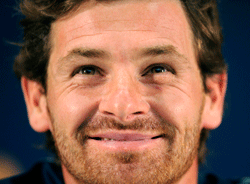 Andre Villas-Boas has outlined his management approach as he was unveiled as Chelsea’s new manager.
Andre Villas-Boas has outlined his management approach as he was unveiled as Chelsea’s new manager.
The Portuguese coach has accepted comparisons with Jose Mourinho are inevitable, but says his regime will not be a one-man show.
Villas-Boas, 33, worked under Mourinho during his Chelsea reign and then followed his compatriot to Inter, before then going it alone and emulating his former boss by guiding Porto to European and domestic glory.
Mourinho arrived in England declaring himself ‘the special one’, while Villas-Boas has vowed to encourage a team ethic at Chelsea.
“I think there is no way you can avoid comparison, it is something that is the interest of the media. I didn’t take the Porto job nor the Chelsea job because Jose made the same steps,” said Villas-Boas.
“They are two of the most sought-after clubs in the world and in the end I had the opportunity and was able to make them find something in me that they thought would continue their route to success.
“Coaching was not a kind of obsession [for me] and neither did I use Jose as the way to arrive into this path, it was something that happened naturally.
“The main important thing that people have to reflect on is that I don’t see the game as a one-man show, I see the game as the getting together of ideas and collective ideas and good players,” he told the club’s official website.
Human qualities
“Chelsea appointed me basically for human qualities and that is what I want to bring into this club again.
“The most important thing is to motivate the players to get their ambitions right, to reflect again on what the club has achieved in the last six years and we need to keep this route to success.
“We are a technical staff that focuses a lot on unlocking potential. We are a technical staff that incentivises a lot of freedom of choice because in the end, when the players are on the pitch, they face different situations that they have to solve without the help of their manager.
“This is the kind of stimulus that we want the players to have, responsibility and making decisions, because in the end the game is decided by them on the pitch.
“It is a clashing together of two good organisations and in the end it is the relationship between all of our players that can lead us to success, and that is what I want to work on.”
Villas-Boas admits the club will have to consider their options in the transfer market.
However, he has stressed that his priority is to retain the core of the squad he inherited from Carlo Ancelotti.
“I think it is something that is normal for any club to have a look into the market, but it is also normal to respect the things we have and the quality of players we have,” he explained.
“So there will be no radical changes. We need to absorb things, respect our winning past and try to focus on 2011/12 as a year when we can continue to win.”
Despite winning the club’s first-ever double in his first season, Carlo Ancelotti was sacked after a barren 2010/11 campaign.
But Villas-Boas admits that the expectations at Chelsea are high, but he is undaunted by the prospect of having to deliver success.
“Chelsea is a club that in the last six years has achieved so much and people are expecting us to be the same way,” he said.
“There is not going to be more or less tolerance for me if I am not successful so this is the challenge I face and I feel confident that we can motivate everybody, not only the players but also the structure.
“I feel confident I can respond to the ambitions of the supporters and the ambitions of the owner and the administration.”
Villas-Boas worked under Bobby Robson and Mourinho at Porto, remaining part of Mourinho’s backroom team when he left for Chelsea then Inter.
Portuguese club Academica appointed Villas-Boas in 2009, before he moved to Porto in 2010.






